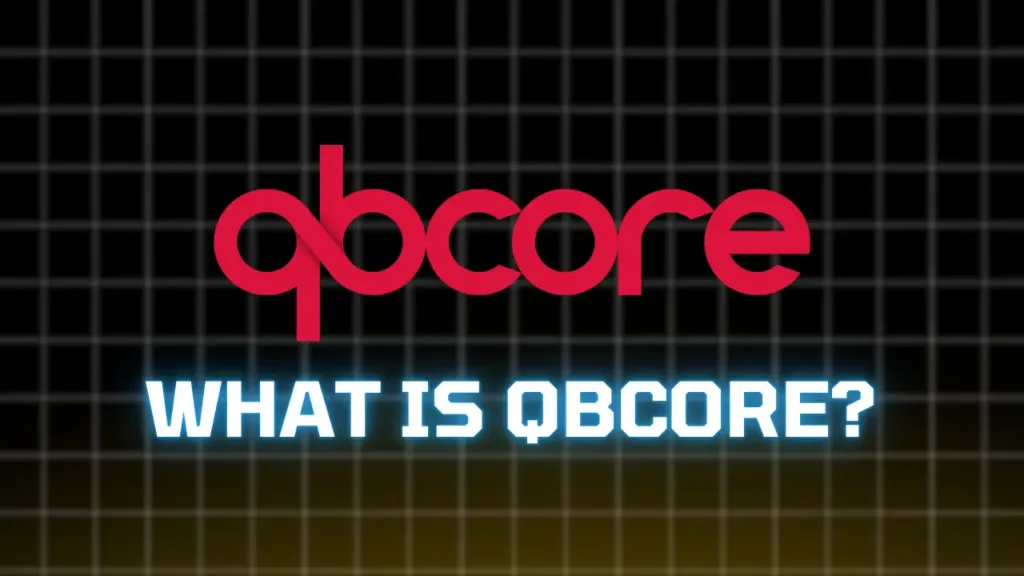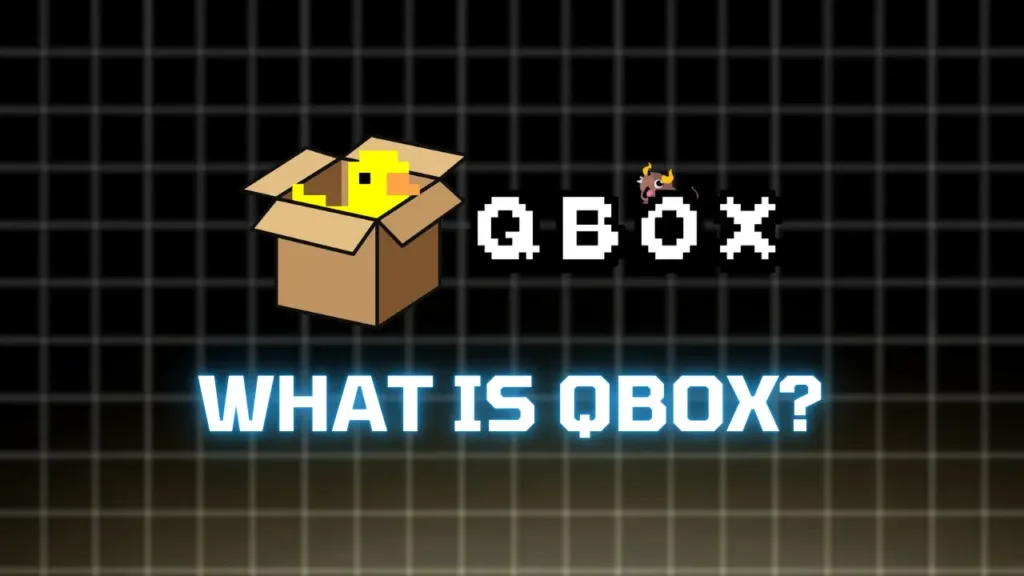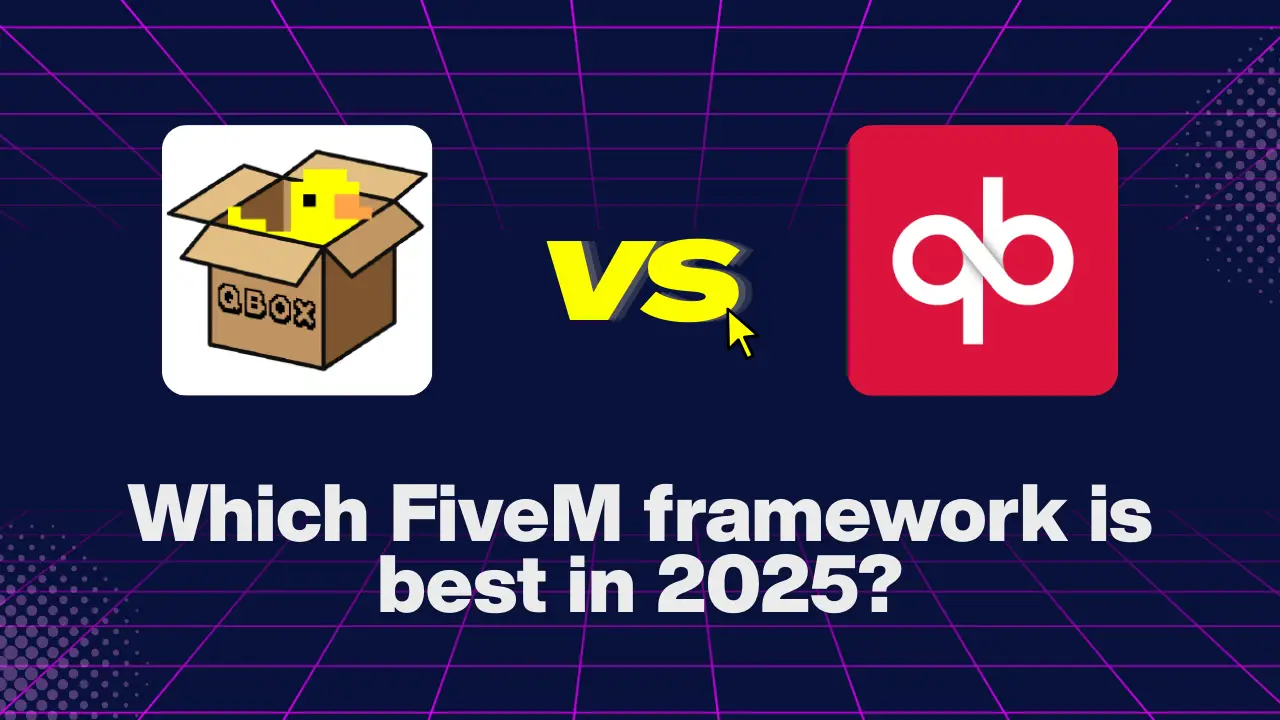Qbox vs QBCore: The Ultimate Guide to Choosing Your FiveM Framework (2025)
Choosing a framework is the single most important decision you will make as a FiveM server owner. It’s the foundation of your entire server, the framework that every script, car, and feature will hang on. For years, the undisputed king of frameworks was QBCore. But a new contender, Qbox, has emerged, and it’s rapidly becoming the go-to choice for developers and server owners who demand better performance, security, and modern features.
So, what’s the right choice for you in 2025? Is it time to move on from the old standard, or is the new challenger not all it’s cracked up to be?
This guide will give you the complete picture of Qbox vs QBCore. We’ll dive deep into the architecture, features, and philosophy behind both Qbox and QBCore. We will provide a clear, head-to-head comparison to help you make an informed decision, whether you are starting a brand-new server or considering a massive upgrade for your existing community.
Check out our framework and script collections:
• QBOX Scripts → https://qboxcore.com/product-category/qbox-scripts/
• QBCore Scripts → https://qboxcore.com/product-category/qbcore-scripts/
• Frameworks hub → https://qboxcore.com/category/frameworks/
Table of Contents
What is QBCore?

Before we can understand Qbox, we have to understand where it came from. QBCore has been a cornerstone of the FiveM roleplaying community for a long time. It provided a comprehensive and accessible starting point for server owners, offering a complete package of essential features needed to get a roleplay server up and running.
At its heart, QBCore is a collection of resources that handle the most fundamental aspects of a server:
- Player Data: Managing characters, money, inventory, and status (hunger, thirst, etc.).
- Jobs: Creating civilian jobs (like taxi driver or trucker) and whitelisted jobs (like police or EMS).
- Items & Inventory: A system for creating, using, and storing items.
- Vehicles: Systems for player-owned garages, dealerships, and car modifications.
For a long time, if you wanted to build a serious RP server, QBCore was the logical choice. It had a massive community, countless free scripts designed specifically for it, and tutorials for almost any problem you could imagine.
However, as the FiveM platform has grown more advanced, some of the cracks in QBCore’s foundation have started to show. Much of its code is several years old, and while it works, it’s not always the most efficient or secure. Performance can be a challenge on larger servers, and its development has slowed significantly, leaving many server owners feeling like the framework has been left behind.
What is Qbox?

Qbox is a modern FiveM framework that began its life as a “fork,” or a spin-off project, of QBCore. However, calling it just a “fork” today would be a massive understatement. The Qbox Project wasn’t created to just fix a few bugs; it was created to completely rethink and re-engineer the core of the framework for the modern era.
The philosophy behind Qbox is built on three pillars:
- Peak Performance: Writing clean, optimized, and efficient code to ensure the server runs smoothly with low resource usage, even with a high player count. This means less lag and a better experience for everyone.
- Ironclad Security: Building the framework from the ground up with security as a top priority to prevent common exploits and protect server owners from cheaters and hackers.
- Modern Development: Using the latest tools and best practices to create a framework that is easier for developers to work with and easier for server owners to manage.
A key part of Qbox’s modern approach is its deep integration with the “ox” ecosystem of resources. It relies on powerful libraries like ox_lib for UI elements, ox_inventory for a feature-rich and optimized inventory system, and oxmysql for database management. These are widely considered the best-in-class resources in the FiveM community, and Qbox is built to leverage them perfectly.
Crucially, the developers of Qbox made a brilliant decision: they maintained backwards compatibility for a huge number of QBCore scripts. This means that server owners with existing QBCore servers don’t have to throw everything away and start from scratch. They can migrate to Qbox and benefit from its superior performance and security while keeping many of their favorite scripts.
Head-to-Head: Qbox vs QBCore Comparison
Let’s break down the practical differences. When you’re in the trenches managing your server, this is what truly matters.
1. Performance & Optimization
Performance is everything. A laggy server with a low tick rate (server FPS) is a dead server. This is where Qbox has its biggest and most undeniable advantage.
- QBCore: Can be resource-heavy, especially when loaded with many scripts. Server owners often spend countless hours trying to optimize, hunt down laggy scripts, and manage server performance. It’s not uncommon to see core QBCore resources using more CPU than necessary due to older, less efficient code.
- Qbox: Was built for performance from day one. Its core scripts are incredibly lightweight, often running at just 0.00ms to 0.01ms of CPU time. By using modern libraries and optimized code, a Qbox server can handle more players and more scripts while maintaining a high server tick rate and a smooth, responsive experience for players. This isn’t just a small improvement; it’s a night-and-day difference.
Winner: Qbox, by a very wide margin.
2. Security
A server’s reputation can be destroyed overnight by a security breach. Cheaters can ruin the experience for everyone, and a poorly secured framework can give them the keys to the kingdom.
- QBCore: Because it is older and so widely used, it has been the target of countless exploits over the years. While many have been patched, its fundamental structure can still be vulnerable. Server owners often have to rely on third-party anti-cheat systems and manual security patches to keep things safe.
- Qbox: Security was a core goal of the project. The developers have systematically gone through the old codebase, identified potential vulnerabilities, and rewritten systems to be more secure by default. This proactive approach to security means server owners can have greater peace of mind knowing their foundation is solid.
Winner: Qbox.
3. Features & Ecosystem
A framework is only as good as the resources and scripts it can run. This is about the tools you have at your disposal to build your unique world.
- QBCore: Has a massive library of existing scripts. If you can think of a feature, there’s a good chance someone has made a QBCore script for it. However, the quality of these scripts varies wildly. Many are old, unoptimized, and no longer supported by their original developers.
- Qbox: Takes a quality-over-quantity approach. It focuses on deep integration with the modern
oxecosystem (ox_inventory,ox_lib, etc.), which are powerful, feature-rich, and actively maintained. Furthermore, because Qbox maintains backwards compatibility, you can still use a huge number of QBCore scripts. You get the best of both worlds: access to a powerful modern ecosystem and the ability to pull from the vast library of older scripts.
Winner: Qbox, as it combines a modern, high-quality ecosystem with backwards compatibility.
4. Ease of Use & Development
How easy is it to get started, customize, and create new things for your server? This is crucial for both new owners and experienced developers.
- QBCore: Is familiar to many developers. However, its codebase can be messy and confusing to navigate. For a new developer trying to learn, it can be difficult to understand how different systems connect, leading to bugs and frustration.
- Qbox: Features a much cleaner, more organized, and better-documented codebase. It follows modern coding standards, making it far easier for developers to understand, modify, and create new scripts for. For server owners, the backwards compatibility makes the initial setup or migration process much smoother than starting from zero.
Winner: Qbox.
Why Are So Many Servers Switching to Qbox?
The community sentiment is clear: there is a major shift happening. Experienced server owners and developers are Converting from QBCore to Qbox, and there are a few key reasons why.
First, there is a strong feeling that QBCore development has become stagnant or “dead”. While it still receives minor updates, it isn’t evolving to meet the modern demands of the FiveM platform. Qbox, on the other hand, is under active, passionate development. It’s constantly being improved, optimized, and updated with new features.
Second, the performance gains are simply too large to ignore. Server owners who have switched report a massive improvement in server stability and smoothness, allowing them to add more content and support more players without the constant headache of chasing lag.
Finally, the move towards the ox ecosystem is a huge factor. Resources like ox_inventory are objectively superior to the old qb-inventory, offering more features and far better performance. Qbox’s native integration with these tools makes it the clear choice for building a high-quality server.
How to Convert Your Server from QBCore to Qbox
If you’re currently running a QBCore server, the thought of switching might sound terrifying. But thanks to backwards compatibility, it’s much easier than you think. You don’t have to delete your server and start over.
While a full technical guide is available in the Qbox documentation, here is a simple overview of the process:
- Backup Everything: Before you do anything, make a complete backup of your server and your database.
- Replace Core Resources: You will replace the core framework files (
qb-core,qb-inventory, etc.) with their new Qbox equivalents. - Run the Conversion Tool: Qbox provides tools to help convert your database tables (like players and vehicles) to the new format.
- Test Your Scripts: Test all of your old scripts one by one. The vast majority of QBCore scripts will work with little to no changes. Some may require minor tweaks, which are often detailed in the Qbox documentation.
- Launch!
The Qbox team has provided excellent documentation to walk you through this process. You can find their official conversion guide at [Official Qbox documentation].
The Verdict: Which Framework is Better in 2025?
After a thorough comparison of performance, security, features, and development, the conclusion is clear.
For a brand-new server starting in 2025, Qbox is the undisputed best choice. It is more performant, more secure, and built on a modern foundation that will set your server up for long-term success. Starting with QBCore today is like building a new house on an old, cracking foundation.
For an existing QBCore server, switching to Qbox is a highly recommended upgrade. The performance benefits alone are worth the effort of conversion. The backwards compatibility ensures the transition is as painless as possible, allowing you to breathe new life into your server without losing years of work.
While we respect the legacy of QBCore and what it has done for the community, its time as the top framework has come to an end. Qbox is the future. It represents the next evolution of FiveM frameworks, delivering the power, stability, and quality-of-life features that server owners have been asking for.
Ready to build a better, faster, and more secure FiveM server? Get started with the Qbox Project today at [Qbox GitHub]!
Frequently Asked Questions (FAQ)
Qbox vs QBCore?
In the Qbox vs QBCore matchup, Qbox is the modern competitor and the recommended choice. It was developed from QBCore’s original code but was completely re-engineered for superior performance (less lag), enhanced security, and active development. While they compete for users, Qbox is designed to be a direct replacement and upgrade for the older QBCore framework.
Is Qbox free to use?
Yes. Just like QBCore, the Qbox framework is a completely free, open-source project for the community.
Will my old QBCore scripts work if I switch to Qbox?
Yes, most of them will. Qbox was designed with backwards compatibility, meaning the majority of scripts written for QBCore will work on Qbox with little to no changes needed.
Which framework is better for performance and causes less lag?
Qbox is far better for performance. It was optimized to be lightweight and efficient, which means your server will run smoother and have significantly less lag compared to a typical QBCore server.
Is it hard to switch my server from QBCore to Qbox?
It’s easier than you think. You don’t have to start your server over from scratch. The Qbox project provides guides and conversion tools to help you move your data, and most of your old scripts will still work.
Do I have to use ox_inventory with Qbox?
It is highly recommended. ox_inventory is a core part of the modern Qbox experience. It is more optimized, has more features, and is much more secure than older inventory scripts like qb-inventory.
Is the QBCore framework “dead”?
While it’s not officially “dead,” its development has slowed down significantly, and the code is considered outdated by many developers. Qbox is actively developed with frequent updates, bug fixes, and new features.
Where can I find scripts for Qbox?
You can still use most resources made for QBCore. For new, optimized scripts, search for resources that require modern libraries like ox_lib, as they are built with performance in mind and will work perfectly with Qbox.
Where can I get help or support for Qbox?
The best place to get help is the official Qbox Project Discord server. There you can talk directly with the developers and other community members who can help you with any problems.
For a brand-new server in 2025, which one should I choose?
Qbox, without a doubt. For any new server, Qbox provides a better foundation for performance, security, and future growth. Starting with Qbox is the smartest choice.
What is the #1 biggest difference between Qbox and QBCore?
The biggest difference is performance and modern code. Qbox was rebuilt to be much faster, use less of your server’s power, and be more secure than QBCore.



Add comment